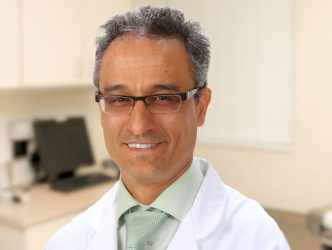A laboratory sleep study is considered the gold standard for accurately diagnosing sleep disorders. Our team of sleep specialists employs the latest technology to monitor various brain activities and body systems while the patient sleeps. A board-certified sleep specialist analyzes the results from the sleep study and provides the referring physician with a timely report. For patients diagnosed with a sleep-related condition, our physicians are always available for follow-up consultations as needed. Most insurance covers sleep testing and treatment if the individual is referred.
Types of Sleep Studies
- Polysomnography (PSG) is an overnight test that measures multiple variables during sleep, including the patient’s airflow through the nose and mouth, blood pressure, electrocardiographic activity, blood oxygen level, brain wave patterns, eye movement, and the movement of respiratory muscle and limbs. We also observe various sleep stages and body positions of the patient throughout the night.
- Multiple Sleep Latency Test (MSLT), also called a “nap study,” is used to see how quickly a person falls asleep during the day. The MSLT is the standard way to measure the level of daytime sleepiness. A patient’s brain waves, heartbeat, eye and chin movements are recorded. This study also measures how quickly and how often one enters the rapid-eye-movement (REM) stage of sleep.
- Maintenance of Wakefulness Test (MWT) is a daytime polysomnographic procedure which measures the patient’s ability to stay awake. It is used to verify the effectiveness of the therapy the patient has been prescribed.
Preparing for Your Sleep Study
Once you are referred to the Trinity Health Sleep Center, you may be required to see a sleep specialist prior to your sleep study. If a sleep study is deemed necessary, you will be asked to make an appointment to return and spend the night in one of our private, home-like bedrooms. You may be asked to keep a sleep diary for one to two weeks prior to the sleep study. During this time, try to follow your normal sleep routine and habits.
On the day of your sleep study, you may take any medications that you usually take, unless otherwise directed by your physician. Do not take any naps, as they may interfere with your study. Consume foods and drinks as you normally would, but avoid caffeinated foods and beverages, and alcoholic beverages, after noon. Before you come, eat dinner, shower, and remove make-up, lotions, oils, and hairspray.
What to Bring
When you come in for your sleep study, you’ll want to bring:
- An overnight bag with personal items including your toothbrush, soap, shampoo, etc. (your room includes a private bathroom).
- Loose, comfortable clothes to sleep in.
- Your insurance card and all medications that you use daily (prescription and non-prescription, including nasal sprays, sinus medication, and/or nasal strips).
- IMPORTANT: if you’re already using CPAP, please bring your mask with you.
- Although pillows are provided, you may prefer to bring your own.




